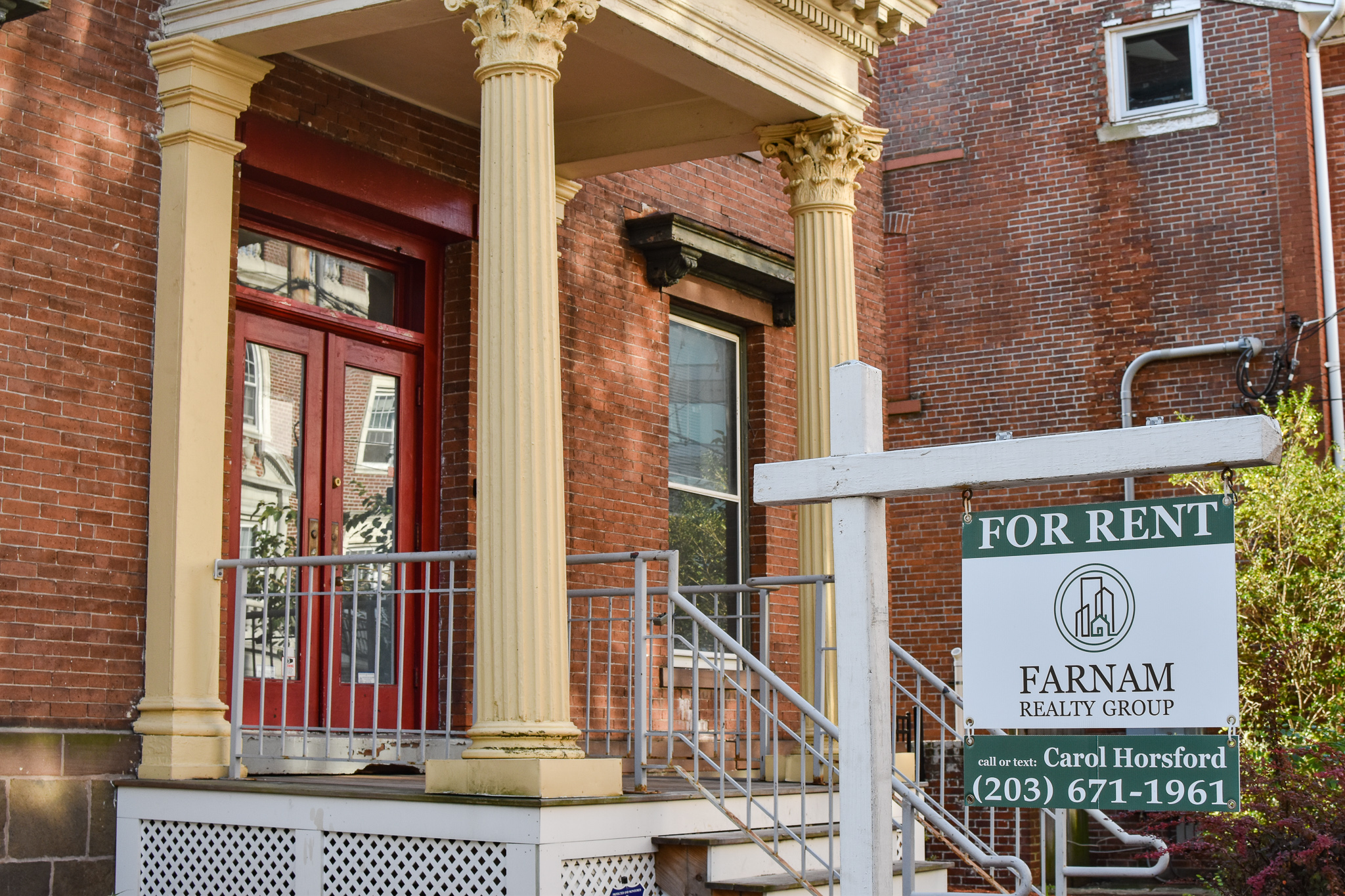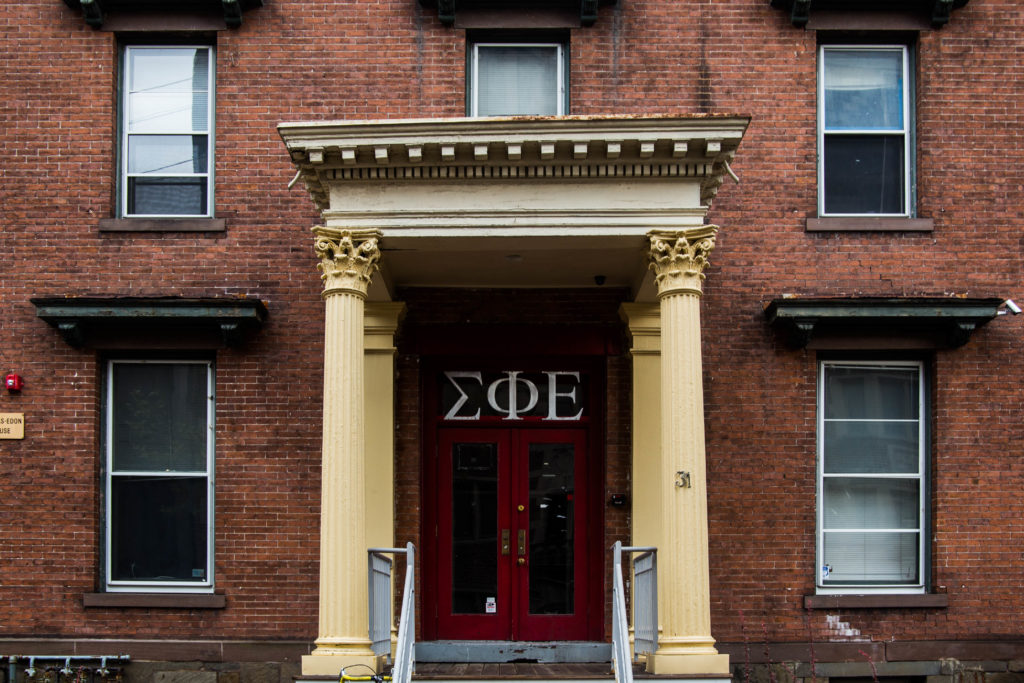
Karen Lin, Contributing Photographer
Yale’s chapter of Sigma Phi Epsilon will be no longer— and the organization that will take its place will neither carry Greek letters nor strictly be a brotherhood. The seventy-odd members of the fraternity chapter voted confidentially this September to disaffiliate from its national organization and voted again in October in favor of opening membership to all genders.
“There has been growing discomfort in our relationship with the national organization over recent years, and I feel as though our community has been distant from the national fraternity network for quite some time, both in our involvement and values,” wrote Nathan Somerville ’22, SigEp’s current president, in a statement to the News. “As such, we have taken this chance to build an independent social organization without the limitations once imposed.”
According to Somerville, of the 55 members who voted on Sept. 9, a near unanimous bloc — 98 percent — voted in favor of disaffiliation, which exceeded by around 10 votes the simple majority agreed upon by the chapter to move the decision forward. Members are still deliberating on the name of the new organization.
Internal discussions about the prospect of disaffiliation have been ongoing for years, but the COVID-19 pandemic has produced new reasons and more latitude to advance the process now.
The pandemic has forced Greek organizations to either rethink how to appropriately socialize or risk creating hotspots of viral transmission. And fraught conversations about racism and sexism on college campuses have sharpened calls to ban Greek life altogether.
31 High St.
Earlier this summer, SigEp nationals sold the Yale chapter’s High Street house to a private owner, which chapter members say partially motivated their disaffiliation vote.
Property records show that the fraternity’s house on 31 High St. was sold by SigEp Housing of Connecticut Delta to Robin Sunrise LLC on Aug. 6 this year. According to Heather Kirk, chief communication officer of the SigEp national headquarters, the selling price of $1,525,000 was above current market value but sold at a loss on the overall property debt. The house has been owned by SigEp since 2006, when it was purchased for $1.1 million. A representative of Robin Sunrise LLC did not respond to a request for comment.
According to Kirk, the house was sold because no chapter members committed to signing a lease for the upcoming academic year.
“SigEp Housing of Connecticut Delta has long supported the chapter at Yale, and even when maintaining the house meant taking a financial loss, if the chapter was committed to signing leases and filling the home’s occupancy, we were willing to help,” Kirk wrote. “With no lease commitments, the sale was necessary.”
Fraternity brothers told a different story: The property was an unprofitable investment, increasingly unjustified as national Greek organizations contend with the economic crisis that has put many in financial straits.
Past occupants of the house paid rent to SigEp Housing of Connecticut Delta, which used to run and maintain the property. Under the new ownership, both members and non-members of the fraternity are eligible to rent apartments in the house. The house is currently undergoing renovation, and the three Greek letters that had formerly marked the property have disappeared.
When nationals sold the High Street property in the summer, the chapter had few reasons to stay affiliated. By severing ties, the chapter would no longer owe dues to the national organization — seen by some as a barrier to entry.

The disaffiliation process
Although current fraternity brothers have voted to disaffiliate, the process itself is a knotty undertaking involving months, if not years, of legal guidance and paperwork.
SigEp brothers have already notified the National Board of Directors that they seek to relinquish the Connecticut Delta charter, which governs the Yale chapter. The request is pending board review, according to Kirk.
“We believe students at Yale would benefit from the distinct community that SigEp provides — one focused on leadership, personal and professional development experiences,” Kirk wrote in an emailed statement to the News. “We are disappointed that the chapter is seeking disaffiliation after having not taken advantage of these opportunities in recent years, seeing fraternity and sorority life at Yale as a primarily social outlet.”
Should the national organization stall the brothers’ attempt to close the Yale charter, SigEp members suggested that they could alternatively resign from the chapter en masse. The national organization could then still keep the chapter open without membership and initiate a second attempt to invite new Yale members into the fraternity.
Disaffiliation past and present
Seeking disaffiliation is not new among Yale’s Greek-lettered organizations. LEO, another fraternity on High Street, formally broke from Sigma Alpha Epsilon nationals in August of 2018. Then-chapter members of LEO expressed that the decision came because they no longer wished to pay dues to their national organization or depend on its support. LEO’s formal announcement, which came in 2016, came after allegations of sexism and racism arose against Yale’s SAE chapter and its national organization.
And when Fence Club, a popular coed social group, was revived in 2007 after decades of dormancy, it did so sans its original affiliation to Psi Upsilon.
Unfettered by national SigEp policy, which restricts membership to any individual who identifies as a man, the disaffiliating chapter’s members voted to go coed in the first week of October. Held after a chapter-wide town hall discussion led by a committee of five members, 96 percent of those who voted supported opening membership to all genders, according to Somerville.
Several members explained that the organization’s decision to gender integrate naturally followed disaffiliation.
“This has been a point of major conversation within the chapter for many years now, and given our group’s disaffiliation from the national fraternity, we saw this as an opportunity to finally propose the change that I believe is long overdue,” Somerville wrote to the News.
The decision marks the second time a single-gender fraternity at Yale has transitioned to become coed. None of Yale’s other single-gender fraternities have announced any concurrent initiatives to accept women and nonbinary members.
“A lot of those gender barriers weren’t sensible to begin with, and make even less sense when you have the type of understanding about gender a large number of people in our generation have,” said one member on the coeducation committee, who requested anonymity for fear of retribution. He added that the pandemic’s halt on most social life also has given the group greater opportunity to “plan it out and put some real thought into it.”
Greek life and gender inclusivity
The vote also occurs in the context of wide-ranging conversations of gender inclusivity and sexual violence on college campuses.
According to the 2019 Association of American Universities’ Campus Climate Survey on Sexual Assault and Misconduct administered at Yale, female students reported that fraternity houses were the most common location where nonconsensual sexual touching takes place.
Another report released by the Committee on Social Life and Community Values last year surveyed Yale College students on their social experiences at Yale. Nearly half of the overall respondent pool noted they had attended fraternity parties, though students expressed complaints on the inaccessibility of Greek spaces and their dominant presence in Yale’s social climate. Such comments, the report notes, frequently made mention of “social exclusivity, hyper-sexualization, and class/racial stratification.”
Engender, a student coalition founded in 2016, has been spearheading efforts to increase equity and inclusivity in social spaces at Yale. When Engender petitioned single-gender fraternities at Yale to open their rush processes in 2017 and 2018, SigEp was the only fraternity that allowed women and nonbinary students to participate, though they notified the prospective members that they would not be granted bids due to national policy.
The chapter has seen controversy in its 17 years. In 2011, a SigEp brother driving a U-Haul truck carrying beer kegs at the Yale-Harvard football game tailgate killed one pedestrian and injured two others. The national SigEp fraternity, the local Yale chapter and more than 80 of the Yale chapter’s former members settled lawsuits related to the accident in 2016 after a lengthy litigation process.
Along with the University and eight other fraternities at Yale, SigEp was also a defendant in a 2019 lawsuit launched by Anna McNeil ’20, Ry Walker ’20 and Ellie Singer ’21, three of Engender’s co-founders, on Title IX claims of gender discrimination. The lawsuit was dismissed on all but one count by the District Court of Connecticut this past January.
Singer and Walker wrote to the News that they are “not surprised” SigEp has chosen this moment to disaffiliate and “wish them well on their efforts.”
“We hope others follow suit instead of continuing with a broken status quo,” they wrote. “The time for gender equity has long since arrived.”
Planning is still underway this semester for a formal open rush process at the beginning of the next semester, contingent on public health guidelines. The new group has not released any formal policies for the upcoming rush cycle. Since first-years will not be on campus, the group plans to primarily recruit a cohort of non-male members from the class of 2023.
The anonymous coeducation committee member acknowledged that the “power imbalance and age imbalance, coupled with the gender dynamic” of male upperclassmen inducting younger women and non-binary members could make the rush process “tricky.”
“How do we ease into this as best we can while being sensitive to having a history of being all male?” he asked.
Somerville explained that the structure and membership operations of the new organization will be largely similar to previous years, though the recruitment process is under review for revision.
He also confirmed that the organization has no plans to expand its size of membership.
“I believe this can only positively impact campus culture at Yale — there is no good reason why men should have a monopoly on the social scene here,” Somerville said. “I sincerely hope more organizations also follow suit, as this will undoubtedly lead to a healthier and more equitable social climate.”
Greek chapters are not formally recognized by Yale as official student organizations.
Emily Tian | emily.tian@yale.edu
Clarification, Oct. 21: An earlier version of this article included a joint statement from the three co-founders of Engender. In fact, only two were consulted in writing the statement; McNeil was not. The article has been updated.







